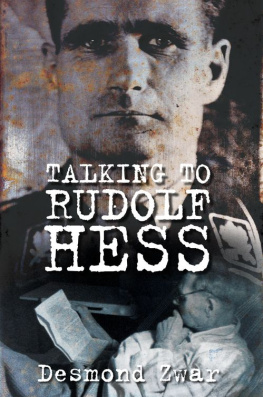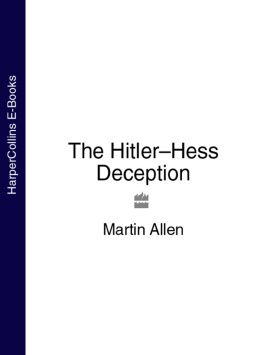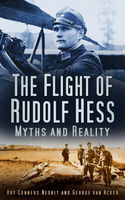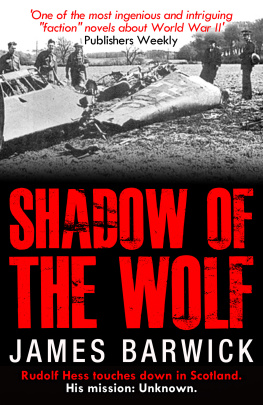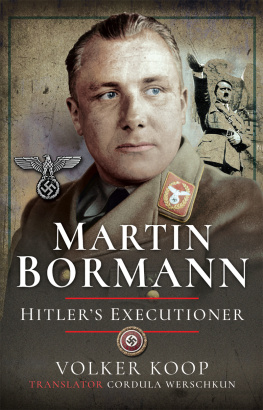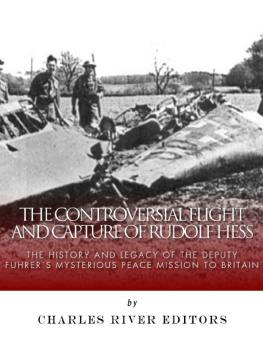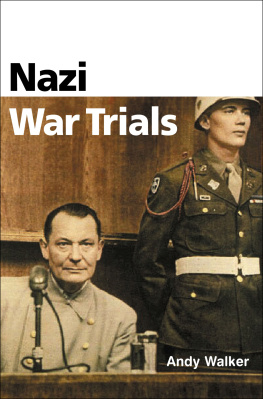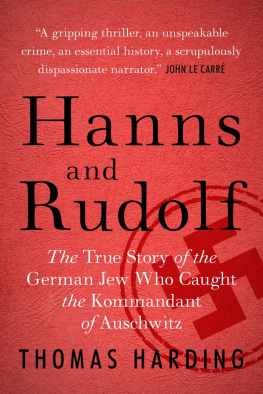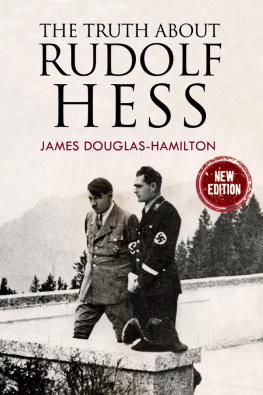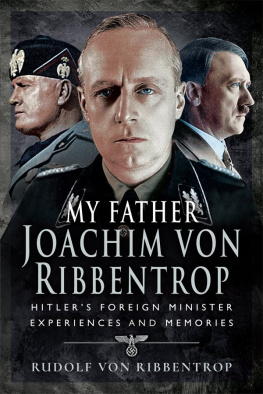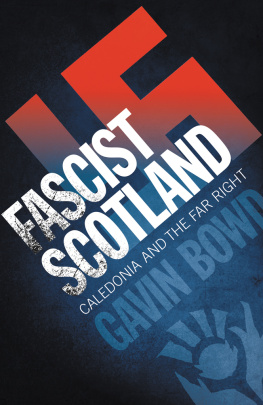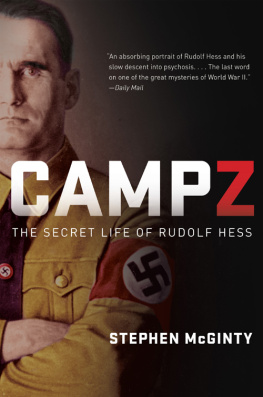Desmond Zwar - Talking to Rudolf Hess
Here you can read online Desmond Zwar - Talking to Rudolf Hess full text of the book (entire story) in english for free. Download pdf and epub, get meaning, cover and reviews about this ebook. year: 2010, publisher: The History Press, genre: Detective and thriller. Description of the work, (preface) as well as reviews are available. Best literature library LitArk.com created for fans of good reading and offers a wide selection of genres:
Romance novel
Science fiction
Adventure
Detective
Science
History
Home and family
Prose
Art
Politics
Computer
Non-fiction
Religion
Business
Children
Humor
Choose a favorite category and find really read worthwhile books. Enjoy immersion in the world of imagination, feel the emotions of the characters or learn something new for yourself, make an fascinating discovery.
- Book:Talking to Rudolf Hess
- Author:
- Publisher:The History Press
- Genre:
- Year:2010
- Rating:3 / 5
- Favourites:Add to favourites
- Your mark:
- 60
- 1
- 2
- 3
- 4
- 5
Talking to Rudolf Hess: summary, description and annotation
We offer to read an annotation, description, summary or preface (depends on what the author of the book "Talking to Rudolf Hess" wrote himself). If you haven't found the necessary information about the book — write in the comments, we will try to find it.
Talking to Rudolf Hess — read online for free the complete book (whole text) full work
Below is the text of the book, divided by pages. System saving the place of the last page read, allows you to conveniently read the book "Talking to Rudolf Hess" online for free, without having to search again every time where you left off. Put a bookmark, and you can go to the page where you finished reading at any time.
Font size:
Interval:
Bookmark:
For my late wife, Delphine, who transcribed the Hess tapes. And often wept.
Desmond Zwar, Beechworth, Australia, 2009.
Hitler, you know, had great respect for the British people, the British Empire and
British culture andthe civilisation that Britain had brought into the world
Rudolf Hess, speaking from his Spandau prison cell.
I awoke on a chilly winters morning, burrowing further under the blankets, summoning the courage to make a dash from the warm bed to the shower, when the phone rang.
Desmond? Neil Hawkes here. The chief of the London bureau of the Melbourne Herald, my old paper in Australia; a pedantic man, as always, taking his time to explain himself while Im freezing in my pyjamas by my desk. I silently urge him to get to the point.
He had been working through the night, he said, and there had come on the teleprinter an odd message from one of the Herald groups stable, the Australasian Post. A request he obviously felt was probably a time-waster, but grudgingly he would pay me to check it out anyway. Im not enthusiastic about the end result. (Yes, yes. Get on with it!)
I knew, as he did, that the Post was a notorious tits and bums magazine devoted to sex, Australiana, oddball stories and sport. It tended to run pictures of outback toilets and dogs with two heads. By no stretch of the imagination had it ever touched on matters intellectual; and to my knowledge had rarely shown an interest in what was going on anywhere outside Australia.
That was why the London man was so puzzled, he ruminated. The Posts editor desired an interview with the celebrated artist, Dame Laura Knight, the only living female Royal Academician. Hes said something in the cable about Dame Laura painting nudes on horseback. Hell want pictures. The penny dropped! Nudes and horses. Together! I said Id go and see the old lady. It helped pay the rent. I dashed off to the shower. Working at the time for a lowly wage on the Daily Mail, I knew I had to grasp at freelance crumbs in a thin week.
Dame Laura lived alone in St Johns Wood, and when I phoned, she charmingly invited me to take tea with her at three oclock the next afternoon. I took a tube train to the nearest station and walked along a beautiful terrace of houses and rang the doorbell. She came to the door: a small, greying woman in her late seventies. Greeting me with a firm handshake, she led the way upstairs to her huge, airy studio. Cuttings in the Mail newspaper library had said she was a painter of world rank, and that made my task more embarrassing. How was I going to ask her about naked ladies riding horses? And then arrange to have the paintings photographed for the salacious readers of the Post?
A Royal Doulton tea service sat ready on a tray with a plate of tiny cucumber sandwiches. But before we sit down, let me show you my studio, Dame Laura said. She led me on a tour of her paintings of ballet dancers, clowns and, I noticed, circus horses. The old lady must have been stunningly attractive when she was young. She wore her hair in a plait that was wound round her head; her eyes twinkling with merriment, raising her hands in girlish joy when she laughed. In the middle of the barn-like room, gazing at a sketch of one of her ballerinas I took the plunge.
Dame Laura, I hope you wont be offended by this, but I have been asked if you would show me your paintings of er naked girls on horseback.
She looked puzzled for a brief second, then she laughed. Oh my boy! I am sorry to disappoint you. I paint nudes as you see and all my life I have been fascinated by circuses and have painted circus people and their horses. But never together. Have I disappointed you?
I assured her, red-faced, that she had not. Only some prurient fellow back in Melbourne might be frustrated. We settled down to enjoy our China tea. From my place on the sofa I glanced across the studio and tried to remember where Id seen the large painting that dominated the room. Then the penny descended in the foggy brain for the second time. It was the courtroom dock scene at the Nuremberg Trials; the line-up of the notorious accused: Hess, Goering, Von Ribbentrop, Speer. Dame Lauras eyes were twinkling again. You recognise it? I assured her, yes of course I did. She was the official war artist at Nuremberg. This was one of the worlds most famous paintings. That was my working painting, she explained. The original is in the Imperial War Museum. Nudes on horseback. I felt ill.
I explained, on the second cup of tea, that I was interested in German history. As a small boy, with a German name, I had been the butt of taunts and bashings at my country school. Nazi! Nazi! Id never forgotten the shame. We walked across to the painting. Look at poor Goering, she said. He had a terrible cold while I was painting him. Then, as we returned to the sofa, she said: You must forget about interviewing me. There is a great friend of mine who was at Nuremberg, and was ever so much more important. When he comes to London he takes tea with me and sits where you are sitting now. Colonel Burton Andrus was the Commandant of Nuremberg prison, the building next to the court where the trials were going on. His job was to keep those terrible men in their cells; to prevent people getting them out; or even murdering them; and that was a real possibility. He has never told anybody his story. Why dont you let me put you in touch with him?
She always had her nap at four oclock. Why didnt I wait in the studio for her, and in the meantime, read the air-letters she had written from the courtroom to her husband Harold, in London? They would probably give me an idea of what the Nuremberg Trials were like. She went downstairs and returned with a bundle of the blue letters in a box. There, she said. That will help you understand.
I had in my hands a pile of letters that were a daily diary. They described in vivid, intimate detail what she had observed from her tiny observation box high up on one of the courtroom walls. And indeed, there at the top of one letter was her pen-picture of Goering: He fidgets, sniffles, wipes his nose constantly. He looks miserable, she had told Harold. On the left-hand corner of the page there was a thumb-nail sketch of the fat, hated man, nose dripping.
By the time she came back I had made up my mind: I would contact Colonel Andrus in Tacoma, Washington, and ask him if I might discuss my writing about his Nuremberg life. The security of the Daily Mail had to be put to one side. Sure, the outlay of time and money would be considerable; but if he was prepared to talk for the first time about what went on in Nuremberg prison, it would be a literary scoop. The old boy sounded a character, but a formidable one. I wondered if hed break his silence after all these years, and why he hadnt by now?
I went back to my one-room bachelor flat at Cadogan Gardens, London, and wrote to Col. Andrus. It was 11 July 1965:
You will have had a note from Dame Laura Knight introducing me. She has spoken a lot about you and after researching at my newspaper library at the London Daily Mail, I have become more intrigued than ever that you must hold the real story of Nuremberg that has never been written. I feel the real, personal story by you, of how those men lived and how you worked on their physical and mental well-being would be something people all over the world would want to read.
I know this may be forward and presumptuous and I hope you are not offended
Weeks went by and then came a two-paragraph note from Andrus. Maybe, he said. One day, maybe. For months after my visit to Dame Laura Knight, our sporadic, mostly one-sided correspondence seemed to be destined to go nowhere. It was only when I pointed out in a final letter that he was 75 and history might die with him, that I had his phone call.
Font size:
Interval:
Bookmark:
Similar books «Talking to Rudolf Hess»
Look at similar books to Talking to Rudolf Hess. We have selected literature similar in name and meaning in the hope of providing readers with more options to find new, interesting, not yet read works.
Discussion, reviews of the book Talking to Rudolf Hess and just readers' own opinions. Leave your comments, write what you think about the work, its meaning or the main characters. Specify what exactly you liked and what you didn't like, and why you think so.

